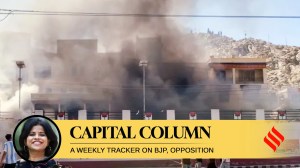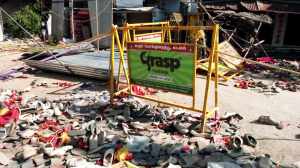Pakistani farmers fight Army’s expanding empire
Ownership or death’’ is the slogan farmers here have adopted in their fight for the land their forefathers first tilled nearly a c...

Ownership or death’’ is the slogan farmers here have adopted in their fight for the land their forefathers first tilled nearly a century ago. But the farmers have a formidable foe: Their landlord is the Pakistani army.
A contractual change instituted three years ago transformed the farmers from sharecroppers to renters. Many tenants are angered by the change, which they say is intended to drive them off the land at Okara Military Farms — a 17,000-acre grain and dairy operation that’s one of numerous Pakistani businesses run by the military. Seven villagers have died in clashes with police or paramilitary forces since 2000, say leaders of the movement.
|
Gen paid $12 wealth tax
|
|
NEW DELHI: Pakistan President Pervez Musharraf paid no wealth tax for five years on his properties though he had declared in November 1999 that he had done so, according to South Asia Tribune, a US-based magazine run by a Pakistani. ‘‘And finally when he did pay wealth tax in 1999-2000 on his assets worth much more than (Pakistani) Rs 30-40 million in the market (or over half a million US dollars), he coughed up only Rs 710 or $12’’, the magazine reported, claiming it had a copy of the official document. (PTI) |
The standoff in this fertile region of Punjab province has become a focal point for public anger over the military’s control of economic assets in Pakistan, from farmland and profit-making universities to industries such as cement production and trucking.
The military’s assets in the real estate empire include horse farms, tracts of irrigated croplands and prime residential property in major cities, much of which is allotted to senior officers as part of their retirement packages.
‘‘They’ve become such a huge corporate empire in this country, and the land-grabbing is just one part of it,’’ said Aasim Sajjad Akhtar, a Yale-educated economist and coordinator of the People’s Rights Movement, a nonprofit group that’s taken up the tenants’ cause. Army officials accuse groups such as Akhtar’s of exploiting the Okara Farms tenants to further a leftist political agenda. ‘‘This is a law-and-order situation,’’ said Maj Gen Mahmud Shah, DG Remount. In 2001, the Lahore High Court ruled that the farmers were ‘‘in illegal occupation”.
But the army’s claim to the land is also open to question, because the actual owner of the land is the Punjab provincial government. The army pays a token fee to use the land, and two years ago the province refused an army request to transfer title to the property free of cost. Under the old sharecropping system which dates to 1913, the army supplied seed and fertilizer to the tenants, who gave the army half of their crop. Three years ago, concluding that civilian managers were stealing some of the army’s share, officials instituted the system.
Among the 4,000 residents of Village 5/4-L was Bashir Ahmed, 65, who hobbled over on crutches to display the scar from a leg wound he suffered when Rangers opened fire last summer. As he lay in hospital, Rangers ‘‘forcibly’’ inked his thumb impression on a rental agreement. (LAT-WP)





- 01
- 02
- 03
- 04
- 05


























